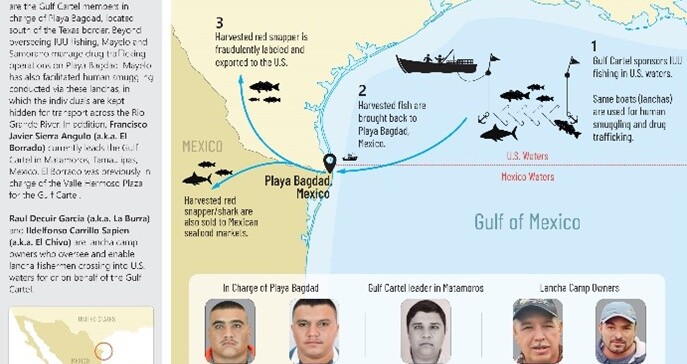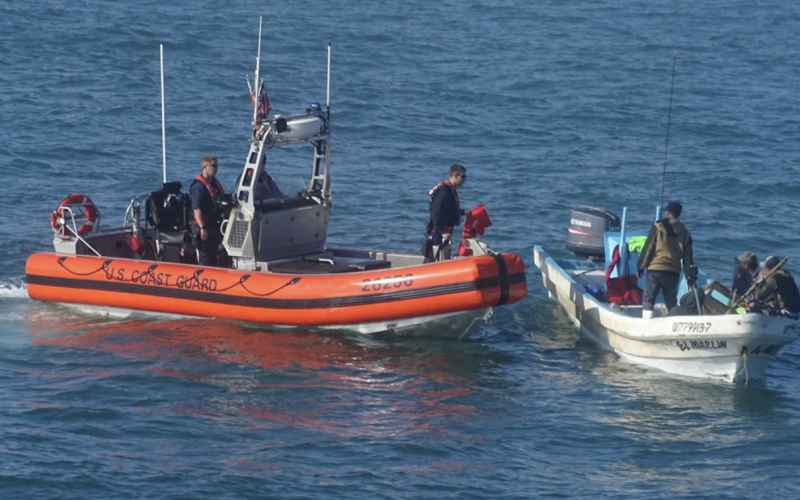Incessant poaching by Mexican fishermen off Texas is directly tied to the Gulf Cartel and its other criminal trafficking in narcotics and human smuggling, U.S. Treasury Department officials said in announcing sanctions against five cartel operatives.
The sanctions seek to block transactions and property transfers between the targeted cartel members and U.S. citizens. Illegal fishing operations in U.S. Gulf of Mexico territorial waters typically target snapper and shark species, smuggling their catch from off Texas back to fishing camps in Mexico – and often trans-shipment to U.S. buyers, according to Treasury officials.
“Today’s action highlights how transnational criminal organizations like the Gulf Cartel rely on a variety of illicit schemes like IUU (illegal, unreported and unregulated) fishing to fund their operations, along with narcotics trafficking and human smuggling,” said Bradley T. Smith, the Treasury department's acting under secretary for terrorism and financial intelligence.
Smith said the sanctions move Nov. 26 is “part of a whole-of-government approach to combatting transnational criminal organizations.” Treasury officials worked with the Coast Guard, Department of Homeland Security and Drug Enforcement, and coordinated closely with La Unidad de Inteligencia Financiera (UIF), Mexico’s financial intelligence unit.
The Coast Guard routinely intercepts Mexican crews fishing illegally in U.S waters near Texas. Using lanchas, lightweight 20- to 30-foot slim hulls with outboard motors that can run at 30 mph, the fishermen attempt to slip in and out at night, landing their catch on beach camps a few miles south of the border.

“The Gulf Cartel engages in the illicit trade of red snapper and shark species through lancha operations based out of Playa Bagdad, also known as Playa Costa Azul, a beach located several miles south of the U.S. border,” according to a Treasury Department statement. “Apart from their use for IUU fishing in U.S. waters, lanchas are also used to move illicit drugs and migrants into the United States.”
Red snappers and shark are more abundant in U.S. waters thanks to stricter management, so Mexican fishermen intrude to exploit the resources. “They then bring their catch back to lancha camps into Mexico, where the product is ultimately sold and, oftentimes, exported into the United States. This activity earns millions a year for lancha camps,” and causes significant bycatch of protected species like sea turtles, Treasury officials said.
“The Gulf Cartel is a long-standing, powerful drug trafficking organization that operates throughout Tamaulipas State, Mexico. The Gulf Cartel has moved arms, drugs, and migrants into the United States, and was responsible for the kidnapping and murder of American citizens in March 2023,” according to the Treasury department.
The order targets:
“Ismael Guerra Salinas (a.k.a. Mayelo) and his brother Omar Guerra Salinas (a.k.a. Samorano) are the Gulf Cartel members in charge of Playa Bagdad. Beyond overseeing IUU fishing, Mayelo and Samorano manage drug trafficking operations on Playa Bagdad.”
“Mayelo has also facilitated human smuggling conducted via these lanchas, in which the individuals are kept hidden for transport across the Rio Grande River.”
“In addition, Francisco Javier Sierra Angulo (a.k.a. El Borrado) currently leads the Gulf Cartel in Matamoros, Tamaulipas, Mexico. El Borrado was previously in charge of the Valle Hermoso Plaza for the Gulf Cartel.”
“Raul Decuir Garcia (a.k.a. La Burra) and Ildelfonso Carrillo Sapien (a.k.a. El Chivo) are lancha camp owners who oversee and enable lancha fishermen crossing into U.S. waters for or on behalf of the Gulf Cartel.”







